Brewster Browser The BA’s Interim Studies: Experiential Learning at Work
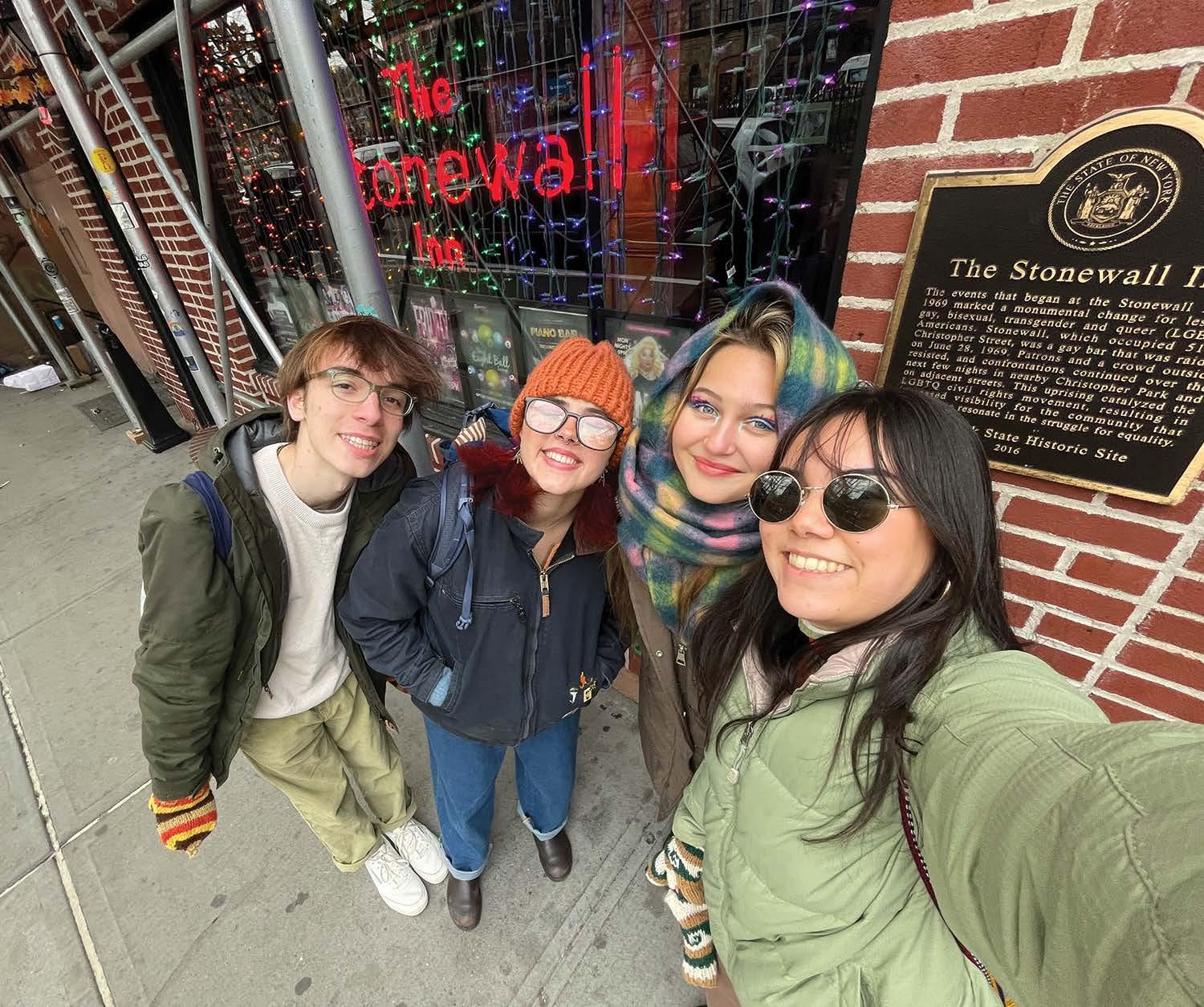
As part of Brewster's Interim Studies program, leading up to March break, students engaged in learning experiences either of their own or of a teacher's design. Offerings included woodworking, cermaics, spycraft, painting with Bob Ross, a cultural immersion trip to NYC, and a backcountry skiing trip, among others. Here are a few photos!
Pipe Bursts
by Zoe Hausler ’24
in Academic Building Over December Break
When returning from the long winter break in January, Brewster students and faculty were surprised by a pipe burst that occurred in the Academic Building (AC) during Christmas Weekend. The pipe burst triggered the sprinklers, alerting the fire department to the problem and they rushed over to be the first at the scene. Although the water pipe burst originated in the Team Cooper biology lab, the damage permeated into classrooms below, affecting Teams Wingard, Cornwell, and the administrative areas. Ms. Kristy Kerin was fast on the scene, quickly informing Brewster students and parents about the issue at hand. Although this is unfortunate, Headmaster Ms. Kristy
Kerin highlights her gratitude towards various staff, faculty, and administrators who dedicated their Winter Break to help guarantee the prompt arrival of students this winter trimester.
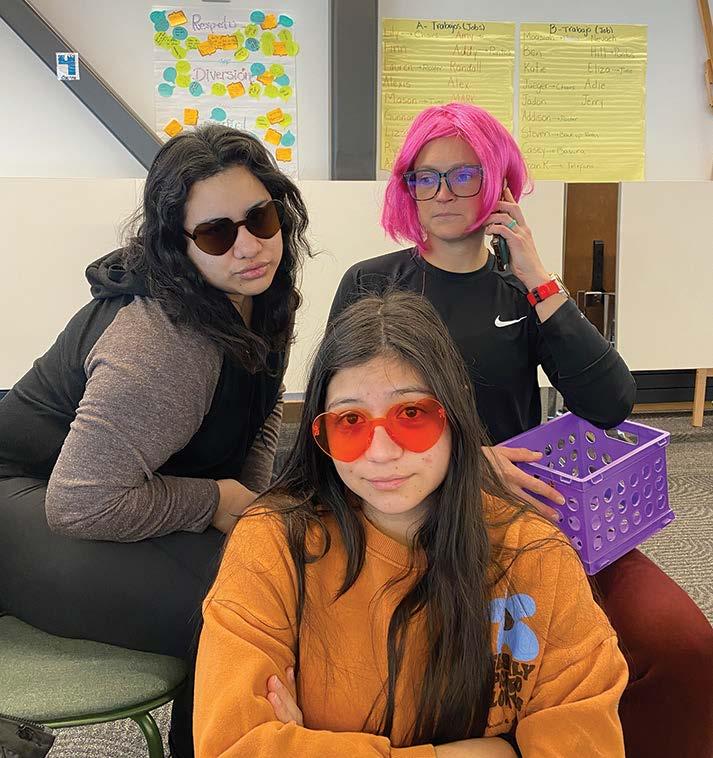
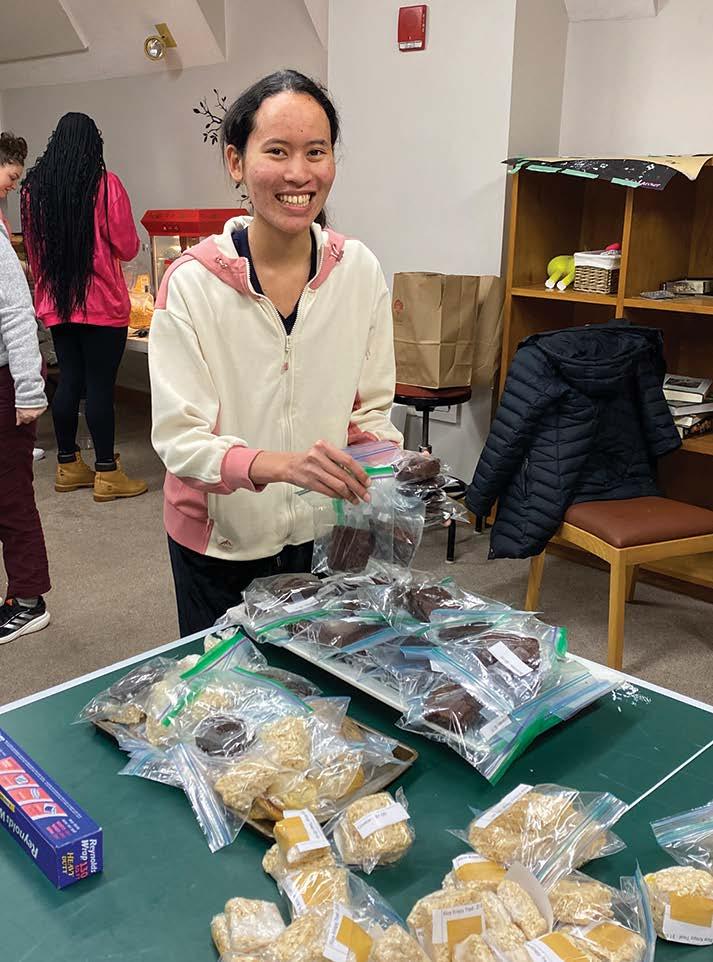
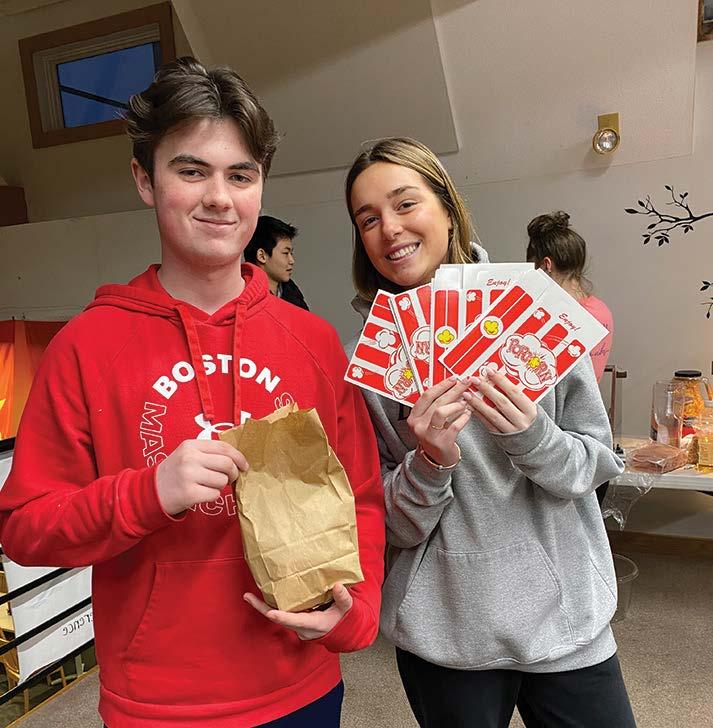
“I could not be more proud or grateful to work alongside such extraordinary people who are so devoted to our school and students,” said Ms. Kerin.
The source of the burst was not the result of time, but rather suspected to have emerged from the power outage problems Brewster and other locations in Wolfeboro were experiencing during that weekend. Although there is no set time to expect the reopening of those areas in the AC, the side door close to Sargent Hall is anticipated to open again soon.
As the construction teams worked diligently to rebuild these parts of the AC, they were able to find small tokens of Brewster’s history integrated into the walls. Hidden within the walls of the registrar’s office, a transcript from an alum was found, in addition to a book of hymns in the Wingard space. The spaces damaged are expected to return to full use in even better condition than before. While moving through the AC, Mr. Reilly emphasized his appreciation to the Brewster community and all those who worked effortlessly to aid our school. Teachers such as Ms. Raf, Ms. Proulx, Ms. Diaz, and Mr. Davis have been able to swiftly adapt to their new learning spaces as the damages have forced them to relocate to the Rogers, the Bobcat Den, and other flex rooms.

Snapchat Sabotages Social Skills
by
You open Snapchat. You have a request from your hallway/classroom/ sports/social media crush. You accept it, giddy. They send you a picture of their ceiling, so you send one of the side of your face. It’s a bold move, but it works: they send the side of their face back. They took two minutes to reply, so you’ll take four in order to show that you aren’t desperate. Eventually, you’ll move onto full face pics. This will continue for a few weeks, but you’ll never actually speak in person. Maybe
Cyan Magenta Yellow Black 1 February 28, 2023 Wolfeboro, NH Volume 45 Issue 3
Liam Fahey ’24, Sylvie Skibicki ’23, Zoe Schwartz ’23 and Elisha-Grace King ’23 stand in front of the historic Stonewall Inn in New York City. They are taking part in the "Local to Global: Peace, Sustainability and Citizenship in NYC" Interim Studies experience, led by Mr. Steven Davis and Mr. Tom Hill.
photo by Elisha-Grace King
Eliza Spindler '25
Aum Pechkamnerd ’23 packs snacks and baked goods for a Dorm Dash order, a fundraiser sponsored by the "Making a Difference" Interim Studies students. Led by Mrs. Hammond, the group focused on community service projects.
(right) Jack O'Neill ’25 and Mackenzie Olson ’24 pack popcorn for the Dorm Dash project for "Making a Difference", which raised money for needy local children's organizations.
Ana FitzGerald ’24, Paulina Trott ’24, and Ms. Varga-Wells suit up for the "Master of Disguise: The Art of Spycraft" experience.
cont on pg. 2
photo courtesy of Ms. Alicia Childers ’01
Anti-Intellectualism: The New Attack on Books
by Elisha Grace-King ’23
Is reading for pleasure destroying our brains? It’s a topic that is sweeping political and educational news stories across the country. With the rise of book banning in states like Florida and discourse about reading analysis in corners of social media like “BookTok”, the definition of what reading is, and how it ought to be conducted is controversial.
Prohibitions on free thought and reading are often traits in dystopian political novels which, coincidentally (or perhaps not), are often some of the first to be pulled from public bookshelves. Think of the Handmaid’s Tale or Fahrenheit 451 - stories that criticize restrictions on people’s abilities to express themselves and self-educate.
The cultural phenomenon of people enforcing restrictions upon free critical thought is called “anti-intellectualism”. Think about being told you’re “too deep” for delving into the metaphor in a novel or your ideas are too “far-fetched” for how a movie might commentate
on a current event. All of this is in the hopes that people see what others have constructed for them to look at - not what lies beneath the first layer.
In recent years, there has been a concerning trend of anti-intellectualism spreading across the country. This movement, which seeks to limit access to information and restrict free thought, is a threat to the principles of democracy and the freedoms that we hold dear.
Politically, statewide and local book banning has become a tool for those in power to control the narrative and silence dissenting voices. Books that tackle expository or contentious topics, such as race, sexuality, and politics, are the most targeted. This censorship not only undermines the right to free speech, but also hinders the advancement of knowledge and understanding.
Anti-intellectualism can extend beyond just books and into our educational institutions. There have been attempts to reject scientific facts, such as evolution and climate change,
and replace them with alternative ideologies. This is a dangerous trend, as it undermines the importance of critical thinking and evidence-based decisionmaking.
If future citizens are not consistently practicing critical thinking in reading,
Effects of Social Media: Snapchat Sabotages

cont. from pg. 1
you’ll make eye contact and then feel intense embarrassment.
One day, they’ll send a chat, which will say “Wyd”. You will reply with, “nothing, hbu”. Don’t use punctuation or capitalize letters, obviously. That’s gross. Maybe you’ll have a full conversation, and maybe you’ll eventually hang out. You’re also snapping 60 other people, by the way, and as you click through each posed face, they lose meaning. Your crush is doing the same. You’ll lose interest in them or they’ll lose interest in you, and it will take two days to move on because of the amount of new options to pick from. Kids have acted out this cycle since middle school and many still repeat it in high school.
Snapchat is the perfect place to be sneaky, since it gives users a false sense of security. On Snap, pictures and messages disappear after the other person opens them. Snapchat is risky, though. People can screenshot things and share them, or they can even use another phone to take a picture of their screen. People can say anything they want because it will disappear the next day. You can add complete strangers and have your location on, meaning that anybody can see exactly where you are. Minors’ nude photos are leaked all the time. It’s the perfect place to say or do anything and feel like you won’t get caught. It can be dangerous, and kids download it younger and younger each year.
Snapchat has changed the way teenagers view each other and relationships. Validation is so accessible,
yet it means so little. Users can collect people and brag about them like trophies. “I snap this person and this person and this person”. If your snap score is too high, you’re a slut and if it’s too low, you’re a loser. You can snap somebody for weeks and barely know anything about them. That isn’t a connection, yet people behave like it is! You reply to all of your snaps with a picture of your eyeball everyday just to make sure you don’t lose streaks, and relationships become a game of “who cares the least” through your reply time. You’ll post stories of yourself at a party or looking good just for one person to see, or maybe you’ll snap as many people as you can to fill a void.
Snapchat is a way for teenagers to get validation for their appearances; they can feel wanted when their posed selfies and mirror pics are complimented with a fire emoji… if the person you’re talking to is a romantic, they might even save the picture in the chat! Snapchat isn’t for people to get to know each other on a personal level… that’s what texting is for (or just old-fashioned in-person conversations). Snap is for flirting with people that you’ll avoid in person. It’s for external validation, and soon enough, that validation will get boring. Sending photos of your face back and forth to a person in some sort of tedious, game-y mating dance will become annoying.
When connections begin on Snapchat, you are forced to form perceptions of people based on only what you can see, minimizing the importance of things like personality
Social Skills
and character. When you like somebody, you probably won’t approach them. You’ll add them on Snap and follow them on Instagram and test the waters there before actually speaking. It’s become so normal that many people don’t have the confidence to make first moves in person! They’ll first offer their appearance and the superficial version of themselves and then, after weeks, they might gain the courage to hang out.
Snap has caused people to base more and more of their self-esteem on appearances. It becomes the most important thing and the deciding factor towards whether people will like you or not. If you’re conventionally attractive, you can have a bland personality and still snap countless people, and if you’re not, you’ll have to somehow woo people in person with your personality. This will be difficult, by the way. When using Snap, we can’t help but to judge people based on their appearances. The kids that we snap are reduced to just their faces and bodies rather than their more important qualities.
It’s a great way to stay in touch with people who you don’t necessarily need to speak to every day. It’s casual, fun, and ingrained into teenage social dynamics. That being said, it’s important to recognize the role that it plays and whether it’s benefiting or hurting you. Relying on something as superficial as Snapchat for validation isn’t sustainable, and it may be keeping you from forming real connections. Be self-aware and examine the ways that it may have changed the way you see yourself and others.
our society is doomed to make misinformed decisions that do not truly involve our best interests.
The cultural lack of interest in critical thinking is just a surface-level issue, however. 54% of U.S. adults 16-74 years old - about 130 million people - lack proficiency in literacy, reading below the equivalent of a sixth-grade level, according to the US Department of Education.
Anti-intellectualist sentiments carry over into the general public with parents who worry about the exposure of certain information to their
The Brewster Browser Brewster Academy Wolfeboro, New Hampshire
Editor in Chief: Elisha-Grace King ’23
Managing Editor: Zoe Hausler ’24
Features Editor: Liam Fahey ’24
Nameplate art: Shemar Joseph ’19
Staff members:
Eliza Spindler ’25 Sylvie Skibicki ’23
Faculty Advisor: Jennifer Metcalfe Dumont
From the Editors: The Browser is a student publication, written, edited and proofread by the students under the direction of the faculty advisor. The authors and editors take full responsibility for any errors in spelling, punctuation and grammar that may occur. THE BROWSER IS
BY
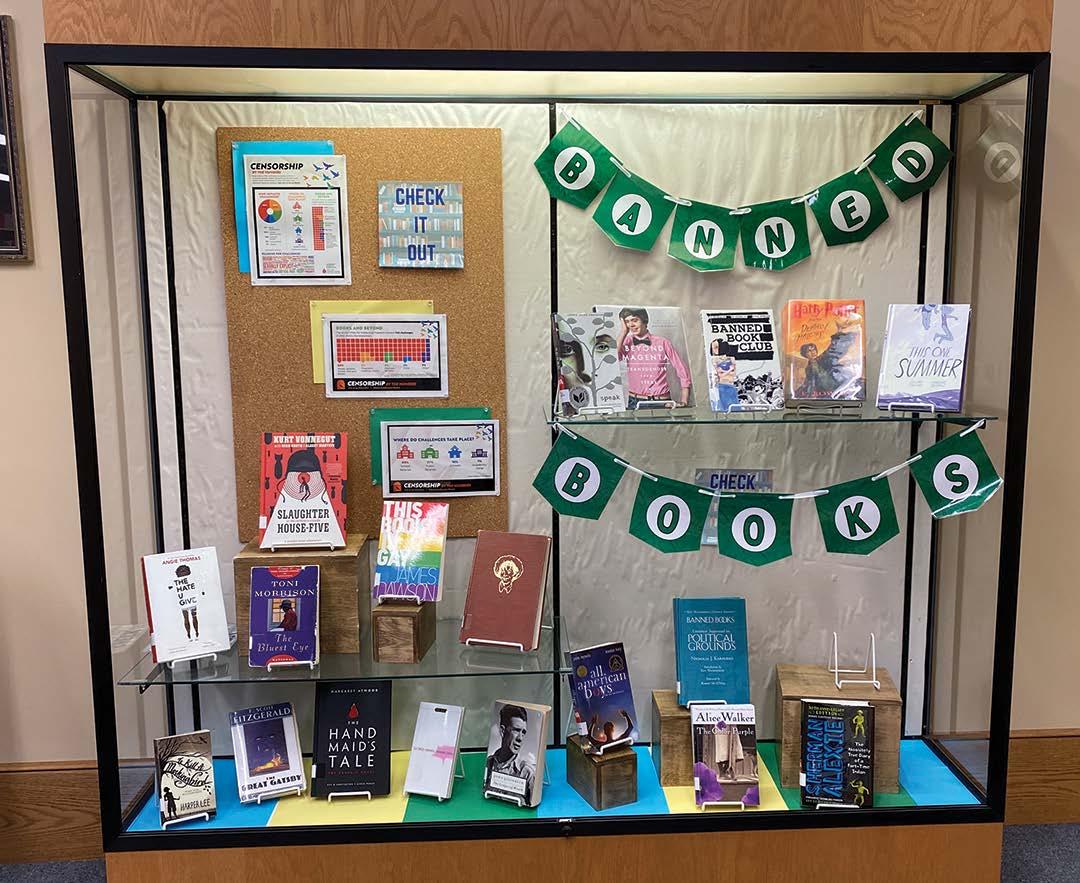
Cyan Magenta Yellow Black 2 Editorial/Opinion Page 2
UNDERWRITTEN IN PART
THE JON KONHEIM JOURNALISM AWARD. February 28, 2023
cont on pg. 4
The Kenison Library's Banned Books display from September 2022.
New Hampshire’s Status as “First-In-Nation Primary” Changing
by Sylvie Skibicki ’23
New Hampshire has been the first state to hold a presidential primary election during every election cycle since 1920, over 100 years ago. This unique status has earned the state the nickname “First-in-the-Nation Primary.” A primary election is part of the process of nominating candidates for the United States presidential elections. It is held by state and local governments, but the United States Constitution has never actually specified the process. Over time individual procedures among different political parties have been developed. Overall it is an indirect election where voters determine the number of delegates that will represent their respective state, and in turn, they will select their party’s presidential nominee.
As previously mentioned, the tradition of New Hampshire holding the first primary dates back to the early 20th century. In 1916, the state legislature passed a law moving the date of the primary from March to February, making it the first primary in the nation. This change was made to give the small state more influence in the selection of presidential candidates. Since then, the New Hampshire primary has played a significant role in the presidential nomination process. Candidates often spend a substantial amount of time and resources campaigning in the state, as a strong showing in the primary can give
them momentum heading into the next step of the presidential election process.
The primary is also significant because it allows voters in the state to see the candidates up close and personal. Candidates often participate in town hall meetings and other events where voters can ask questions and get a sense of their positions on the issues.
However, the significance of New Hampshire’s primary has been somewhat diminished in recent years by the rise of Super Tuesday, when a large number of states hold their primary elections on the same day. Despite its diminished significance, the New Hampshire primary remains an important part of American politics and a symbol of the state’s unique role in the presidential nomination process.
This status that New Hampshire holds has recently been put into question. As of February 4, 2023, the Democratic Party approved the reordering of the 2024 presidential primary, which would make South Carolina the first state to conduct their presidential primary election but New Hampshire officials are not backing down.
“Despite today’s vote, the fight is not over. As we have repeatedly pointed out, New Hampshire law requires us to hold the first-in-the-nation primary, and state Republican leaders have made clear that will not change,” said New Hampshire Democratic Party chair Ray
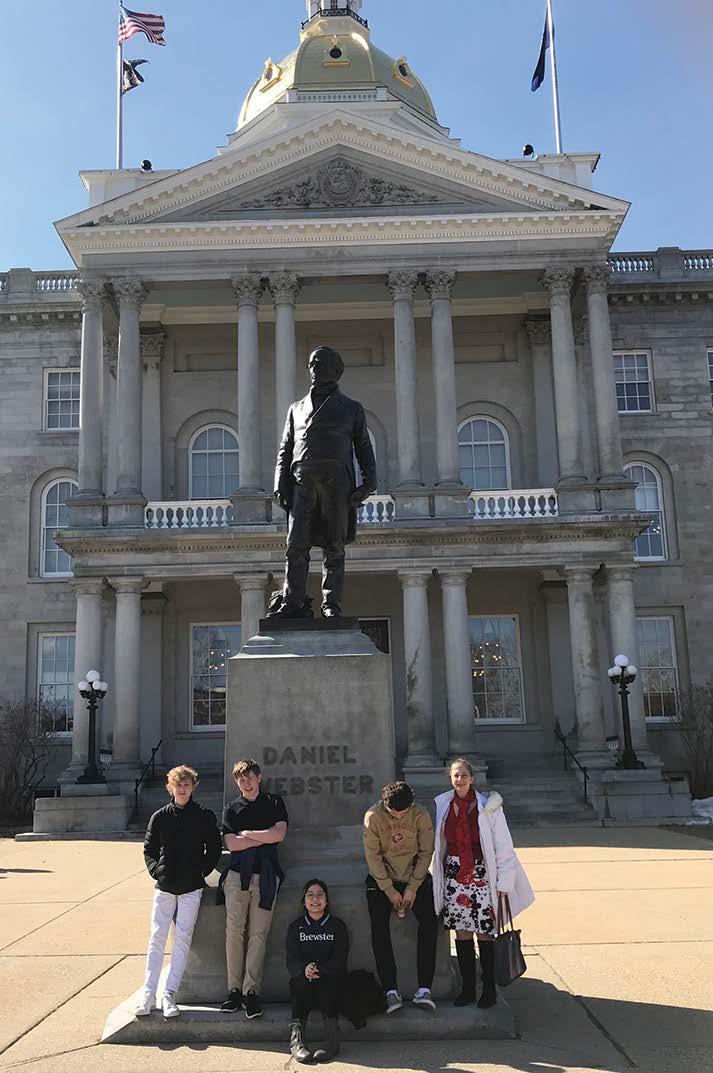
Buckley, which reflects the states utmost opposition to this reorganization.
Why was this proposed in the first place? Switching the order of states conducting their primary elections has been done with the intention of empowering Black and other minority voters. While South Carolina is 27% Black and New Hampshire more than 90% white, South Carolina hasn’t backed a Democrat in a presidential
race since 1976. Still, African American voters are a consistent base of support for the Democratic party. The new order would mean that South Carolina would hold its primary on February 3rd and then be followed by New Hampshire and Nevada.
“We must ensure that voters of color have a voice in choosing our nominee much earlier in the process and throughout the entire early window,” said President Joe Biden, who has been at the forefront of this reordering.
To coincide with our political system of Democracy it is also important to understand the perspectives of those who are directly affected by such changes in our election process. Brewster’s science teacher Emily James is not only an involved member of the Brewster community but also the larger community of New Hampshire and their state politics. When asked how she feels about New Hampshire’s potential to no longer be the first state to hold its primary elections she shared that while people in New Hampshire may be more engaged and educated in politics due to their long-standing First-In-Nation primary status, if the status was granted to another state it would allow for that local community to have an increased voice in politics just as people in New Hampshire have had the privilege of for so many years. The status has allowed Ms. James to be heavily involved in
Estabrook Dining Hall Introduces Meatless Mondays
by Liam Fahey ’24
On Monday, January 16th, if you made your way into the Estabrook Dining Hall you may have noticed a difference in the menu. On that day, the Brewster community celebrated its first Meatless Monday. The dining hall served a variety of plant-based options. The idea of implementing this new change in the community was presented by Brewster’s Environmental Club.
Meatless Monday is a global initiative that encourages people to reduce their environmental impact through food consumption. This has also been implemented in schools across the world as sustainability shifts into the focus of education.
Over the past year, Brewster’s Environmental Club has been working to implement this new change. Through various meetings with Head of Dining Staff Dan Corey to discussions with Assistant Head of School for Student Life James Reilly, this has been an incredibly rewarding experience for the club.
Following the initial meetings, the Environmental Club thought it would be crucial to the process to educate the
community. For countless meetings, the club put together a presentation to present at an All-School that would contain statistics that they hoped would shock the community.
In its presentation to the community, the Environmental Club shared, “Meat consumption and production contributes to 15% of global greenhouse gas emissions. Moreover, eating meat consumes a lot of water which can be equal to almost 20 billion liters of water every day.” The club cited a surprising statistic from the Earth Day Network, “If the whole world did not eat meat for a day carbon emission would be reduced to the equivalent of removing 7.6 million cars from the road.”
The club’s presentation included information about what Brewster is already doing to erase our carbon footprint. Reducing our carbon footprint includes sourcing locally. According to the club’s presentation, “Brewster currently sources food from about 23 local farms. 19 of these farms provide plant-based foods.”
In the presentation, the club further contextualized the food consumption of our Estabrook Dining Hall. “For one
meal of chicken tenders, 103,600 gallons of water is used. For each meal of hamburgers, 270,000 gallons of water is used, and one pound of beef alone costs up to 1800 gal of water to be produced. Meanwhile, tomatoes take up only 22 gallons of water, and tofu, one of the most popular plant-based substitute, requires 244 gallons.”
The following Monday, students took to the dining hall to participate in their first Meatless Monday. The menu contained a plain grilled cheese and one that contained tomatoes.
Dining Services Director, Dan Corey reached out to students via email to share about the impact students had.
“By substituting grilled tomato and cheese sandwiches for the grilled ham and cheese we were able to conserve 8,616 gallons of water and 1,248 pounds of CO2 emissions,” said Corey. “Not having roast beef, turkey, and ham on the salad deli bar we saved 15,250 gallons of water and about 675 pounds of CO2 emissions.”
Students and faculty have had mixed reactions following the implementation of Meatless Monday. Some have felt very positive about the initiative, while
others expressed disappointment over the exclusion of any meat in the meal. In a survey conducted by the Browser via email, the responses were split 50-50 between positive and negative. Some community members felt that more options could be provided, and others just really missed the meat. Among the positive responses, there were many comments about how delicious the food was and how positive the efforts are both for the environment and for our health.
“Amazing. The best food we serve,” said Mr. Patrick Martha. “So many flavorful options, and it’s healthier to boot. Not to mention better for the planet, our children, creatures of the land and sea, the atmosphere...basically everything.”
One anonymous submission from the class of 2023 stated, “I wanna describe Meatless Monday in one word. Delicious.”
As several respondents indicated, there are many different options and ways to get a good lunch at Esta. “I didn’t even notice there had been a change,” wrote one anonymous community member.
Cyan Magenta Yellow Black 3 News February 28, 2023 page 3
Brewster students visit the NH statehouse in Concord on a past Interim Studies trip about political activism led by Ms. Emily James.
4
photo courtesy of Ms. James
cont. on pg.
WORD ON THE STREET
Questions:
1) Who’s your guilty-pleasure artist?
2) Tell us a secret.
3) If you could implement one school rule that everybody would have to follow, what would it be?
4) If the apocalypse happened, who at Brewster would survive the longest?
Hall Talk
What makes people really uncomfortable is when I start eating peanuts with the shells on. – LC I used to eat Play Dough as a kid! Are you kidding me? It smells so delicious! How can you not take a nibble? - ZM
Is this a banana or a duck? – MTC
Have you ever played Pokemon Go before? It’s pretty cool and awesome. We’re no longer two peas in a pod. We are two peas in two opposite pods. – GG
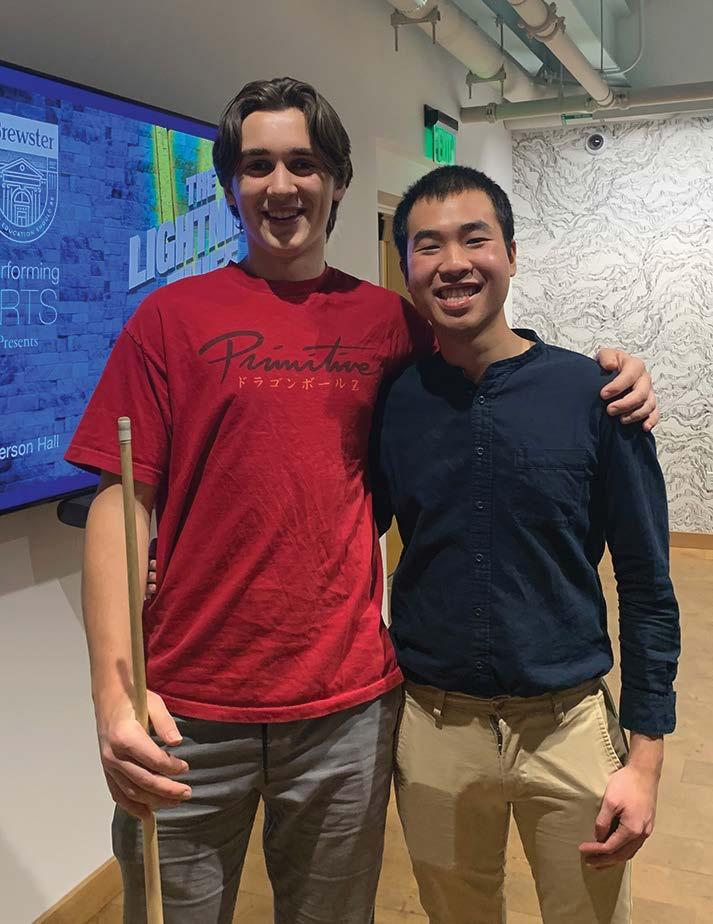
"Corn is not a vegetable" -RK
"I can't speak French without my f---computer"
"I didn't hear what I said!" -LF
1) The Smiths because I would never tell anybody that I listen to The Smiths.
2) I send Coco Maynard funny videos on TikTok.
1) The Hamilton soundtrack.
2) I keep my toothbrush in a mug with Harry Styles’s face on it.
3) There needs to be tampons, pads, and period products in all the restrooms in the school.
4) Eliza and Coco because they’re a power duo and would be like *punches air*
POW pow *more punching*
AH ooh POW
1) R.E.M.
2) I like cats more than dogs.
3) No dress code
4) I'm gonna say Roffee or Mr. Browher because they have all the nature and outdoor skills
1) Summer Walker
2) I used to have a goldfish.
3) Chew with your mouth closed. A lot of people chew gum with their mouths open.
4) I’m saying me. I watched The Walking Dead, so I think I’ve got some strategies. Like Glen.
1) I listen to the La La Land album every day.
2) Tell us a secret Reika!
3) No students are allowed to study on Sunday. And no check-in.
4) Gonzalo because he’s smart and creative and good with technology and can plan for the unexpected.
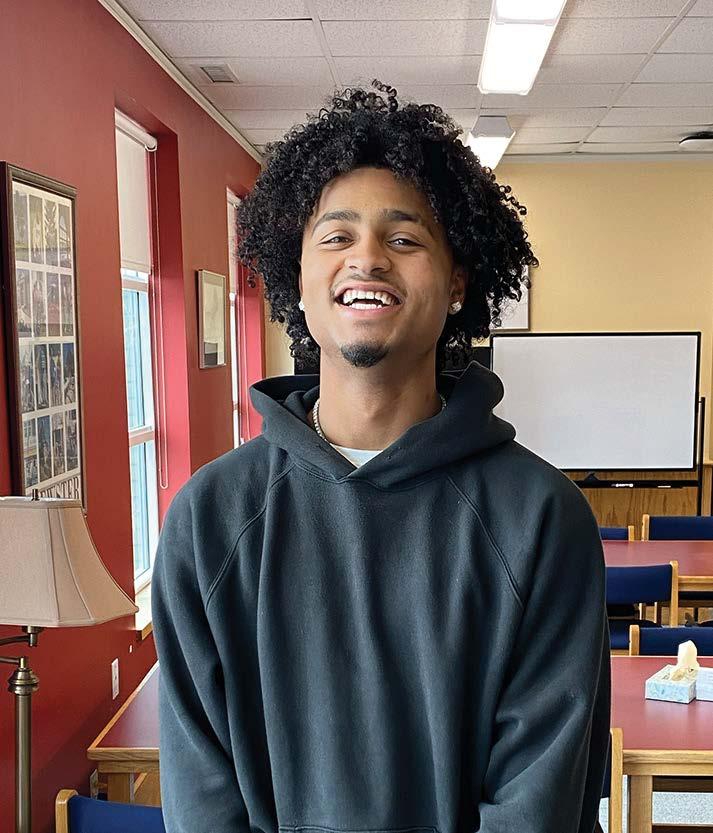
3) Teachers should not be allowed to give BMPs.
4) You know how in The Walking Dead, Negan survives because he’s super aggressive? For that reason, I think Dylan Tal.
"The Joe Biden and Barack Obama of Brewster Academy" EGK
"Sorry, I was just reading a French dictionary" TG
“Is she a model? No, she’s a psychopath though”
“Linguistic meme board” LC
“God, I really want go start a cult” truly, why do girls cut off their hair when they're mad at the world? fashion news from the streets of Wolfeboro: muffs are in
“This was nothing like Harry Potter”
"I’m at GSA, mom" -LC
"Gold condom" -PO
"Iago is mean :("
"I do a lot of stuff in my closet' -ET
“I’m gonna Florilegium at the Ice Spice concert.”
"Did you get a knife, Alicia?" - BM
New Hampshire Changing as “First-In-Nation Primary” Attack on Books
cont. from pg. 2 cont from pg. 3
politics more than states who do not hold their primary elections first and while she is grateful to have been in that position she feels that New Hampshire’s population isn’t representative of all races and the people of the United States as a whole.

“I think we are going to have to just gracefully give it up,” said Ms. James, in her closing thoughts about New Hampshire’s status as First-In-Nation.,

While it is clear that Ms. James is invested in supporting what could be best in representing the entire population in politics, it has often come into question whether or not President Biden values the voices of voters of color or if he is simply approaching this from a tactical perspective in terms of the Democratic party having more voters. Although nothing is set in stone quite yet as changes may occur throughout the summer, the rearranging of the first state to conduct its presidential primary elections has been formally endorsed by the Democratic National Committee and reflects the everchanging state of United States politics.
children. Political rhetoric and online discourse lead parents to distrust and seek to interfere with the education system. Though holding little legislative power, grass roots movements have been successfully campaigning for the banning of certain school books and topics, fueling current political crusades.
According to Pew Research Center, in 2021, roughly a quarter of American adults (23%) said they hadn’t read a book in whole or in part in the past year, whether in print, electronic or audio form. This data is particularly concerning for school librarians, who rely on public use to receive funding for literacy programs and other shared services.
Today, to think critically is an exercise of rebellion. To read a book is innately political. It is up to all of us to resist against the current crusade of knowledge and expression. We must take action to protect the principles of democracy by promoting intellectual freedom. By doing so, we can ensure that our society remains a place where ideas can flourish.
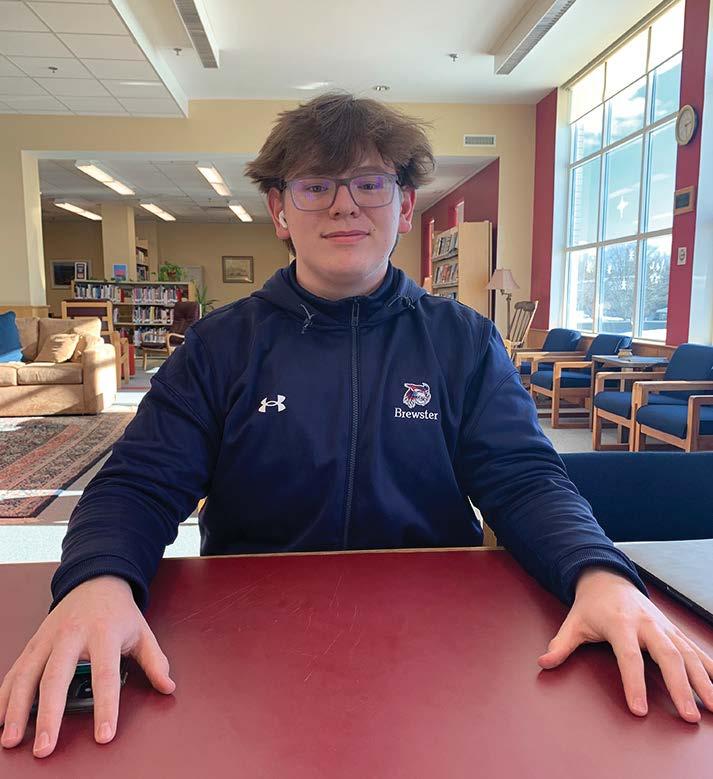
4 Sports Page 4 February 28, 2023 Cyan Magenta Yellow Black
Zak Maxey ’23
(left, pictured here with Petch Ounjaroen ’23, right)
Reika Ueno ’26:
Aaron Clarke ’23
Sasha Bulochnikov ’25
Will Dumont ’25:
Enjoy March Break!













